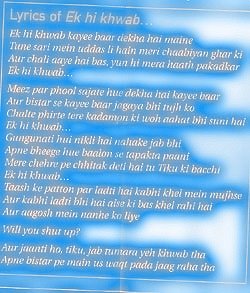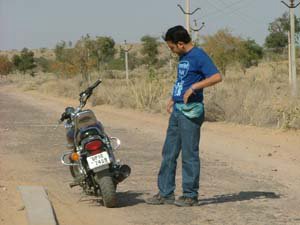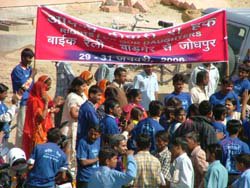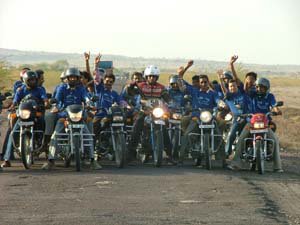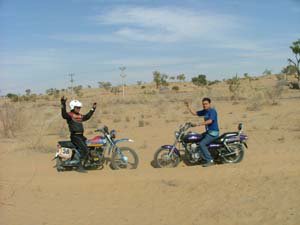There it is. Huddled among other dolls and a few shreds of cloth. It is wearing a blue dress. I don’t remember what mine wore, for it has been sixteen years since I saw it. It might not be there anymore, but I would like to believe that it is there, invisible to the new occupants of my house. It is a dancing girl made of earth, decorating a corner of my friend’s drawing room. Touch it a little and it will start dancing, moving her neck gracefully. My dancing girl, mother bought it, when I was a child, from a potter selling his stuff on a pavement in Lal Chowk.
And sixteen years later, as I speak to you, there is no significant noise outside my room. No guttural voice and no sound of my mother’s U-shaped walker making its presence felt through the small corridor of my house. Mother fell down from her bed again this morning.
 23 years ago, in Srinagar, a team of health officials was to arrive at our school. Their aim was to administer cholera vaccines to children. But for that we were supposed to take the written permission of our parents. Back home I told my father and as expected he wrote ‘No’ on my home task diary. I found it very insulting. Tomorrow all my classmates would take the vaccine and sing laurels of their bravery. And me, I would be hidden in some corner, red-faced with shame. It was not acceptable to me. So I erased father’s nay and wrote ‘Yes’ on the diary. Next morning as the needle of the syringe pierced my left arm, I did not even flinch once. I became an instant hero. But as it is with most acts of heroism, I had to pay a price for mine as well. By late afternoon, a lump had formed in my arm. By the time I reached home I was feverish and drenched in sweat. As I pulled off my shoes, mother saw me and in one instant she knew what had happened.
23 years ago, in Srinagar, a team of health officials was to arrive at our school. Their aim was to administer cholera vaccines to children. But for that we were supposed to take the written permission of our parents. Back home I told my father and as expected he wrote ‘No’ on my home task diary. I found it very insulting. Tomorrow all my classmates would take the vaccine and sing laurels of their bravery. And me, I would be hidden in some corner, red-faced with shame. It was not acceptable to me. So I erased father’s nay and wrote ‘Yes’ on the diary. Next morning as the needle of the syringe pierced my left arm, I did not even flinch once. I became an instant hero. But as it is with most acts of heroism, I had to pay a price for mine as well. By late afternoon, a lump had formed in my arm. By the time I reached home I was feverish and drenched in sweat. As I pulled off my shoes, mother saw me and in one instant she knew what had happened.It was August and even by Kashmir valley’s standards, it was hot. I flung myself on the bed. Mother came and sat next to me. She gave me a glass of milk and kept her fair arm on my forehead. It felt very soothing and cold; like a spring. I went off to sleep. Next morning as I opened my eyes, the fever was gone.
Mother handled the affairs of the house like a seasoned ascetic would control his senses. She knew what was kept where. Rice, coal powder, woollen socks and gloves, soap – she kept a tab on everything. Her daily routine was more or less defined. She would wake up in the wee hours of the morning, wash clothes in the bathroom, sweep and mop the floor of every room and corridor, put burning coal dust in Kangris in winters and ultimately take stock of the kitchen. She did not believe much in spending time in worship. She was not an atheist but her belief was restricted to occasionally folding hands in front of the Shivalinga. Her God was her home and hearth.
But mother was in awe of nature. She feared its fury. Sometimes, when a storm blew, she would close all doors and windows and sit in one corner. When she no longer could face it, she would ask my father, “Will this storm stop?” Father would usually try to pacify her, but ultimately he also lost his patience. “What do you think? Would this storm last till the doom’s day?” he would snap at her. But the same meek heart turned into brave heart when any family member struggled with adversity.
It was in the mid of 1988 that my father had a mild heart attack. Actually father had a pain in the stomach and an injection prescribed by a gastroenterologist reacted, which led to the attack. Everyone in the family was too shocked to react. But not my mother. She single-handedly took my father to the hospital in an auto rickshaw. At the hospital, mother recalls, a doctor appeared like an angel. He had a black mark on his forehead, a result of praying five times a day. The moment the doctor started examining him, my father vomited. Mother says it was so intense that it went right into the doctor’s shoes. But not once did he raise his brow. He kept on treating my father.
By the end of 1989, men like that doctor somehow became rare in Kashmir. One day mother came back from office and she was crying. In the bus someone had tried to help an old Hindu lady in getting down from the bus. Another woman, who was a Muslim, criticised that man saying that the woman he helped was a Hindu and she should have been kicked out of the bus. Mother didn’t know whether what she heard was true or whether it was a nightmare. But what she had heard and seen with her naked eyes was what seemed like holding a mirror in front of Kashmir in a few months time. The time had come, once again, to leave our homeland. The migration began. Salvaging whatever little we could, essentially a few utensils and educational degrees of my college-going sister, we reached Jammu.
After spending a couple of nights in a hotel, father hired a room in a marriage house. It was situated in the old city, amidst a bristling market of saris and dupattas. Every now and then marriage ceremonies were solemnised in the marriage house. When the crude ovens, laced with mud and gas cylinders arrived at the house, we would understand that a marriage was taking place that evening.
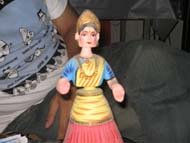
In the ten by ten feet room, ants held a sway. No matter what you put outside, it would be swarmed by ants in a matter of minutes. They appeared in hordes, hundreds of them, attacking every edible item. It was similar to how people would come out on streets in Srinagar, few months before we were forced into exile. Mother obviously could not put up a fight with them, but she always managed to save a bowl of curd from the marauding ants, by keeping it in a basin of water. I always felt that whenever mother took out that bowl of curd, a secret smile would pass her lips. It was like a symbolic victory for her or so I thought.
And one night, that smile was also snatched from my mother’s lips.
I remember that evening. Somebody was getting married in the marriage house. The entire compound was filled with men, women and children, dressed in shimmering clothes. The stereo with huge speakers played popular Bollywood numbers as some of the guests danced on the tunes. And a few metres away, we had closed ourselves in the room.
When the bride was taken away and the noise had eased, there was a knock on our door. Mother opened the door and found a young man standing there. He was holding a plate in his hand. He said that he had been told that there were refugees living here and so he came to offer us some food. Before mother could say something, he handed over the plate and turned back. Mother lifted the cover and I caught a glimpse of the food inside. There was rice, dal and some vegetables. Mother kept on staring at it for some time and then she cried.
After this incident, Mother developed a strange habit. She would tell all, whether they cared to listen or not, “ Our house in Kashmir had 22 rooms”.
For the next few years, we would keep on shuttling from one place to place, becoming victim of the whims and fancies of landlords. We stayed at various places. After the marriage house, we stayed in a window-less room in a dilapidated lodge, where the number of mosquitoes was probably more than the cells constituting our bodies. Then we rented a single room where we ate, studied, slept, cooked and ate our food as well. Then there was another house. The bathroom there had no door and we had to keep on coughing for obvious reasons. Amidst these episodes of Greek tragedy, mother kept her struggle on. Everyday was a battle. From filling water from a leaking tap to bathing under the tap of an adjacent vacant plot, life threw numerous challenges at us.
It was years later that I completed my education somehow and came to Delhi. Few years ago, we bought a 2-bedroom flat in Delhi. But the struggle of Jammu has left a mark on mother. She cannot walk now. Her left leg is paralysed. Sometimes she falls down as she tries to drag her leg. As it happened this morning. She cannot even speak now. Degenerative neurosis, whatever that means. With each passing day, her condition is worsening.
I walk on the road. There is a sea of vehicles moving; endless. Sometimes I feel that there are more vehicles than humans in Delhi. And when I cannot bear the noise any longer, I feel like shouting, “Our house in Kashmir had 22 rooms.”









